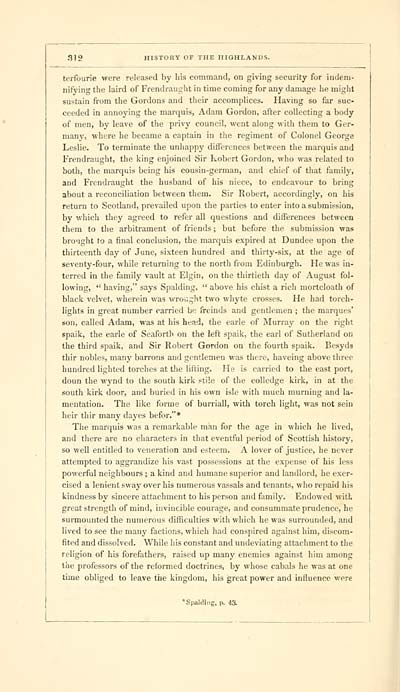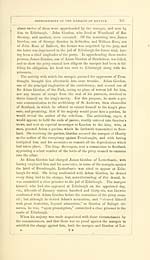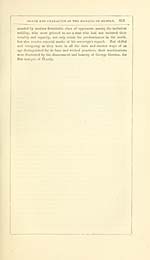Download files
Complete book:
Individual page:
Thumbnail gallery: Grid view | List view

312 HISTORY OF THE HIGHLANDS.
terfourie were released by his command, on giving security for indem-
nifying tlie laird of Frendi'aui;lit in time coming for any damage he might
sustain from the Gordons and their accomplices. Having so far suc-
ceeded in annoying the marquis, Adam Gordon, after collecting a body
of men, by leave of the privy council, went along with them to Ger-
manj', where he became a captain in the regiment of Colonel George
Leslie. To terminate the unhappy ditfercnces between the marquis and
Frendraught, the king enjoined Sir Robert Gordon, who was related to
both, the marquis being his cousin-german, and chief of that family,
and Frendraught the husband of his niece, to endeavour to bring
about a reconciliation between them. Sir Robert, accordingly, on his
return to Scotland, prevailed upon the parties to enter into a submission,
by which they agreed to refer all questions and differences between
thera to the arbitrament of friends ; but before the submission was
brought to a final conclusion, the marquis expired at Dundee upon the
thirteenth day of June, sixteen hundred and thirty-six, at the age of
seventy-four, while returning to the north from Edinburgh. He was in-
terred in the family vault at Elgin, on the thirtieth day of August fol-
lowing, " having," says Spalding. " above his chist a rich mortcloath of
black velvet, wherein was wrought two whyte crosses. He had torch-
lights in great number carried be freinds and gentlemen ; the marques'
son, called Adam, was at his head, the earle of Murray on the right
spaik, the earle of Seaforth on the left spaik, the earl of Sutherland on
the third spaik, and Sir Robert Gordon on the fourth spaik. Besyds
thir nobles, many barrons and gentlemen was there, haveing above three
hundred lighted torches at the lifting. He is carried to the east port,
doun the M-ynd to the south kirk stile of the colledge kirk, in at the
south kirk door, and buried in his own isle with much murning and la-
mentation. The like forme of burriall, with torch light, was not sein
heir thir many daj'es befor."*
The marquis was a remarkable man for the age in which he lived,
and there are no characters in that eventful period of Scottish history,
so well entitled to veneration and esteem. A lover of justice, he never
attempted to aggrandize his vast possessions at the expense of his less
powerful neighbours ; a kind and humane superior and landlord, he exer-
cised a lenient sway over his numerous vassals and tenants, who repaid his
kindness by sincere attachment to his person and familj'. Endowed with
great strength of mind, invincible courage, and consummate prudence, he
surmounted the numerous difficulties with which he was surrounded, and
lived to see the many factions, which had conspired against him, discom-
fited and dissolved. While his constant and undeviating attachment to the
religion of his forefathers, raised up many enemies against him among
the professors of the reformed doctrines, by whose cabals he was at one
time obliged to leave the kingdom, his great power and influence were
'Spalding, p. 43.
terfourie were released by his command, on giving security for indem-
nifying tlie laird of Frendi'aui;lit in time coming for any damage he might
sustain from the Gordons and their accomplices. Having so far suc-
ceeded in annoying the marquis, Adam Gordon, after collecting a body
of men, by leave of the privy council, went along with them to Ger-
manj', where he became a captain in the regiment of Colonel George
Leslie. To terminate the unhappy ditfercnces between the marquis and
Frendraught, the king enjoined Sir Robert Gordon, who was related to
both, the marquis being his cousin-german, and chief of that family,
and Frendraught the husband of his niece, to endeavour to bring
about a reconciliation between them. Sir Robert, accordingly, on his
return to Scotland, prevailed upon the parties to enter into a submission,
by which they agreed to refer all questions and differences between
thera to the arbitrament of friends ; but before the submission was
brought to a final conclusion, the marquis expired at Dundee upon the
thirteenth day of June, sixteen hundred and thirty-six, at the age of
seventy-four, while returning to the north from Edinburgh. He was in-
terred in the family vault at Elgin, on the thirtieth day of August fol-
lowing, " having," says Spalding. " above his chist a rich mortcloath of
black velvet, wherein was wrought two whyte crosses. He had torch-
lights in great number carried be freinds and gentlemen ; the marques'
son, called Adam, was at his head, the earle of Murray on the right
spaik, the earle of Seaforth on the left spaik, the earl of Sutherland on
the third spaik, and Sir Robert Gordon on the fourth spaik. Besyds
thir nobles, many barrons and gentlemen was there, haveing above three
hundred lighted torches at the lifting. He is carried to the east port,
doun the M-ynd to the south kirk stile of the colledge kirk, in at the
south kirk door, and buried in his own isle with much murning and la-
mentation. The like forme of burriall, with torch light, was not sein
heir thir many daj'es befor."*
The marquis was a remarkable man for the age in which he lived,
and there are no characters in that eventful period of Scottish history,
so well entitled to veneration and esteem. A lover of justice, he never
attempted to aggrandize his vast possessions at the expense of his less
powerful neighbours ; a kind and humane superior and landlord, he exer-
cised a lenient sway over his numerous vassals and tenants, who repaid his
kindness by sincere attachment to his person and familj'. Endowed with
great strength of mind, invincible courage, and consummate prudence, he
surmounted the numerous difficulties with which he was surrounded, and
lived to see the many factions, which had conspired against him, discom-
fited and dissolved. While his constant and undeviating attachment to the
religion of his forefathers, raised up many enemies against him among
the professors of the reformed doctrines, by whose cabals he was at one
time obliged to leave the kingdom, his great power and influence were
'Spalding, p. 43.
Set display mode to: Large image | Transcription
Images and transcriptions on this page, including medium image downloads, may be used under the Creative Commons Attribution 4.0 International Licence unless otherwise stated. ![]()
| Early Gaelic Book Collections > Ossian Collection > History of the Highlands and of the Highland clans > Volume 1 > (426) |
|---|
| Permanent URL | https://digital.nls.uk/79677709 |
|---|
| Description | Vol. I. |
|---|---|
| Shelfmark | Oss.247 |
| Additional NLS resources: | |
| Attribution and copyright: |
|
| Description | Selected books from the Ossian Collection of 327 volumes, originally assembled by J. Norman Methven of Perth. Different editions and translations of James MacPherson's epic poem 'Ossian', some with a map of the 'Kingdom of Connor'. Also secondary material relating to Ossianic poetry and the Ossian controversy. |
|---|
| Description | Selected items from five 'Special and Named Printed Collections'. Includes books in Gaelic and other Celtic languages, works about the Gaels, their languages, literature, culture and history. |
|---|

